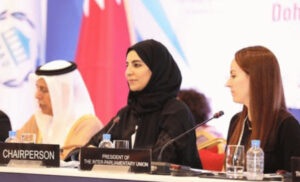 MOON Desk: Sentiment toward women becoming political leaders are changing in favor of gender equality in the Middle East and North Africa, according to polling by the Arab Barometer, a research network that gathers opinions and offers insights into social, political and economic attitudes of citizens across the region.
MOON Desk: Sentiment toward women becoming political leaders are changing in favor of gender equality in the Middle East and North Africa, according to polling by the Arab Barometer, a research network that gathers opinions and offers insights into social, political and economic attitudes of citizens across the region.
Its report on “Gender Attitudes and Trends in MENA” found that while the region’s citizens hold largely traditional views on gender norms, minds are changing toward greater gender equality, albeit slowly.
According to the report, one of the reasons for this shift is the introduction of gender quotas in national assemblies across the region. Another reason is a cross-generational perception of women as an equal member of society.
However, majorities in Sudan, Libya and Iraq agreed with the statement: “In general, men are better at political leadership than women.”
Lebanon and Tunisia were among the countries in the region with most citizens in favor of gender equality.
However, the report said: “There are eight out of 12 cases where more than half of women agree or strongly agree that men are better at political leadership than women.” It cited cultural and traditional norms as part of the reason for this attitude.
“When gender quotas for legislatures were introduced across the region, we see a decline in men and women saying men are better than women at political leadership,” Maryclare Roche, director of technology at the Arab Barometer, told Arab News.
For its latest report, it interviewed 26,000 people between October 2021 and July 2022 in 12 Arab countries: Algeria, Egypt, Iraq, Jordan, Kuwait, Lebanon, Libya, Mauritania, Morocco, Palestine, Sudan and Tunisia.
The report urged governments to tackle structural challenges that stand in the way of increasing female participation in the labor force, such as transportation, childcare and level of wages.
Many of those polled said structural challenges are a greater barrier to female labor participation than cultural challenges.
“This is a positive result for governments trying to engage their female citizens in the economy, as these are concrete concerns that government policies can address,” the report said.





